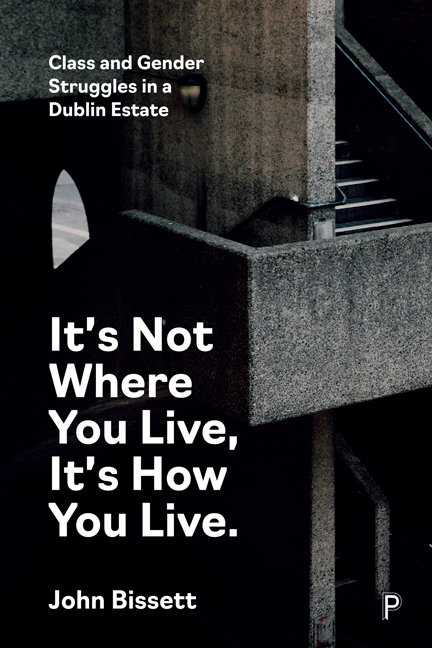2 - Should I stay or should I go?
Published online by Cambridge University Press: 17 January 2024
Summary
‘If the steps could talk they’d have some stories to tell.’ (Maxine)
I am sitting outside Maxine's flat one day. As we are sitting, a heavyset, perspiring city council maintenance man emerges and tells her that “you can have any coloured tiles you like as long as they are white”. He chuckles at his own joke as he goes about the work of replacing some of the tiles above the sink in the kitchen. His one-liner seems a good place to start, in that the council worker, albeit unwittingly, says something profound about Maxine's subordinate position not just within the Irish public housing system but perhaps, more importantly, within the class and gender structures that play such a significant role in shaping and determining the lives that she and other Bridgetown residents lead. The illusion of choice and free will collides against the real of the boundaries and limitations that circumscribe a life. These structures are tight and reproduce themselves over generations, and are critical sources of suffering.
The year is 2014 and the Bridgetown Estate is in a state of flux. Block A and most of Block B in the Bridgetown Estate are being detenanted in order that these same detenanted blocks may be demolished and rebuilt or, in some cases, the old shells will be kept and retrofitted. Everyone in these two blocks must move now to one of a limited number of available empty flats within the estate, but the far greater proportion must move off site. This chapter focuses on an estate as it changes from what it was and is into something else, and how residents engage with this change and what they must do practically. Some residents state clearly that they want to move back as soon as the blocks are redone, while others wish to leave and never come back. Some will decide whether to stay permanently in their ‘transition’ accommodation, even though they have a ‘golden letter’ (as residents call them) that gives them a right to return when the blocks have been rebuilt. This ‘golden letter’ is subject to specific conditions on having no rent arrears and no anti-social behaviour violations and may possibly be revoked if these conditions are breached.
- Type
- Chapter
- Information
- It's Not Where You Live, It's How You LiveClass and Gender Struggles in a Dublin Estate, pp. 15 - 24Publisher: Bristol University PressPrint publication year: 2023



